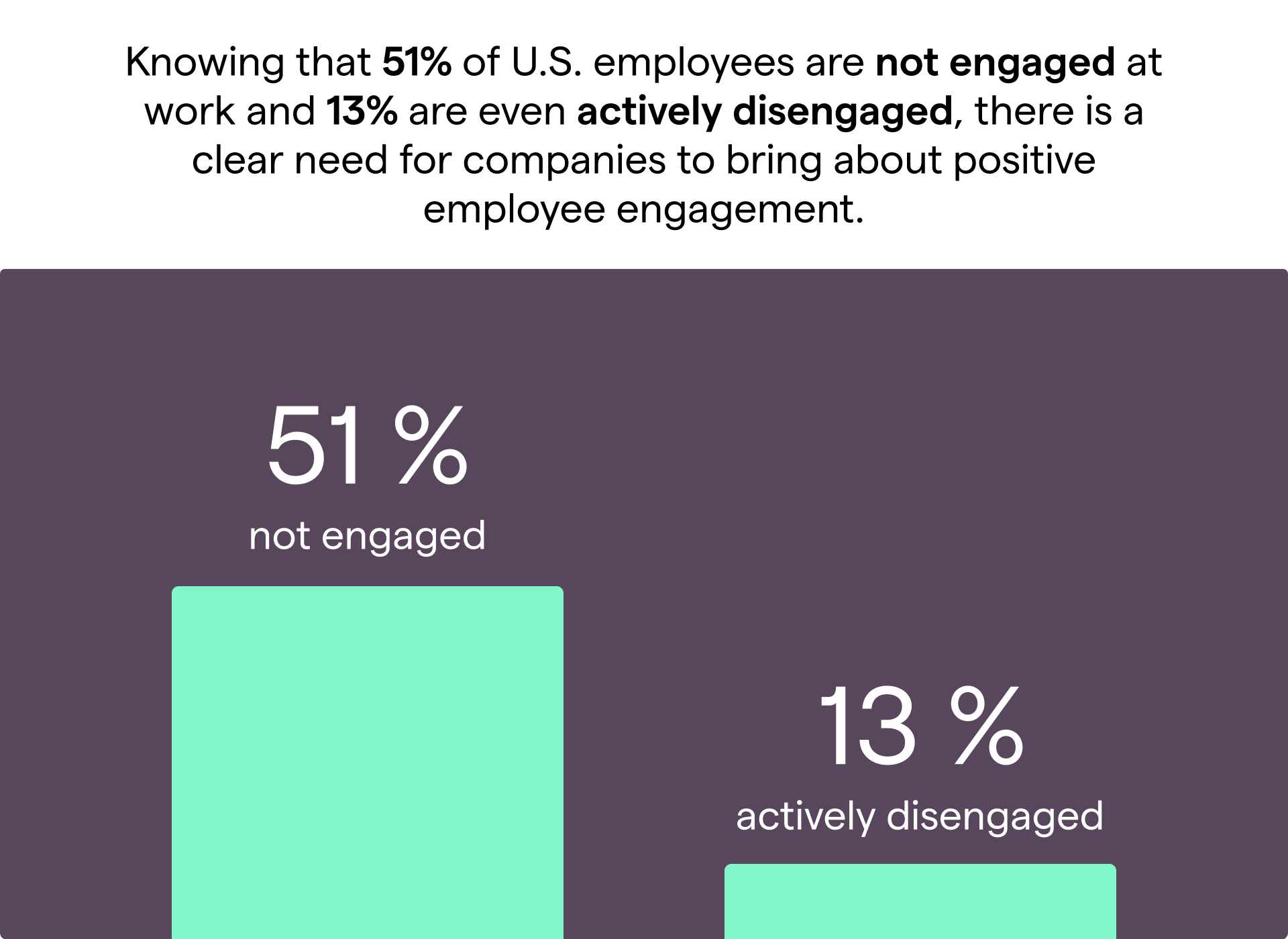Employee empowerment in the workplace is a great way to improve employee engagement and retain your top talent. So, how can you support your employees’ personal and professional development? How does employee empowerment impact the business’s bottom line?
In this blog, we will go over the importance of empowering employees in the workplace, as well as how to do it right.
Foster the culture of empowerment with the right employee communication tools
- Employee Empowerment: Definition
- 3 Levels of Employee Empowerment in the Workplace
- The Current State of Empowerment in the Workplace
- Why Should You Make Employee Empowerment Your Priority
- The Key to Employee Empowerment is Your Company Culture
- The Role of Communication in Driving Employee Empowerment
- Achieve Empowerment in the Workplace With the Right Technology
Employee Empowerment: Definition
Empowerment is based on the idea that providing employees with the resources, authority, opportunity, and motivation to do their work, as well as holding them accountable for their actions, will make employees happier and more proficient.
🎲Check out our article on Employee Engagement, its Drivers, Current Status and How to Improve it and learn how to effectively motivate and inspire your employees!
In other words, allowing employees to take leadership of their roles results in high impact and positive long-term effects for the company and its individuals.

When companies provide employees with enough support individually and professionally, they also integrate employees more closely into the company mission.
3 Levels of Employee Empowerment in the Workplace
Employee empowerment can happen on different organizational levels, and the most common segmentation includes:
- empowerment on the organizational level
- empowerment on the managerial level
- empowerment on the individual level
Let’s now take a look into each of them.
1. Employee Empowerment on the Organizational Level
An organization that cultivates employee empowerment can better:
- Embrace change such as digital transformation
- Recognize employees’ contribution to the business
- Reward responsible ownership in the workplace
- Support collaboration, including cross-departmental collaboration in the workplace
- Foster a culture of employee engagement
- Retain top talent
2. Employee Empowerment on the Managerial Level
Empowered team leaders can:
- Better support the team and help each team member reach their targets
- Provide the information the teams need when they need it
- Inspire and motivate employees
- Help better connect employees, including the ones working remotely
- Facilitate work processes
- Spread team spirit in the workplace
- Better communicate the business goals and long-term vision
- Make the teams more successful
3. Employee Empowerment on the Individual Level
When employees feel empowered and trusted, they:
- Are more willing to go the extra mile for the team and the business
- Take ownership over their work
- Generate ideas
- Know how to take prudent risks to take the business to the next level
- Find meaning and purpose at work
- Feel proud of the company they’re working at
- Feel more motivated and engaged
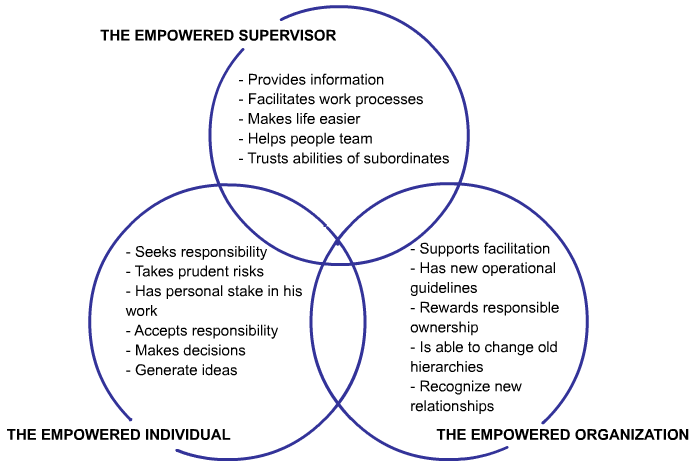
Empowerment on the organizational and managerial levels should exist by default. However, achieving individual empowerment requires much more work and effort and it involves several functions in the organization.
That’s why it is critical for HR and IC functions to work hand-in-hand and align their strategies so they build a great IC strategy together.
The Current State of Empowerment in the Workplace
Even though employee empowerment has become a top priority in most industries, businesses are still struggling to successfully empower their employees.
We’ve compiled below workplace statistics that are quite alarming:
Shocking workplace stats that show the importance of employee empowerment:
- 53% of Americans are currently unhappy at work.
- 79% of people who quit their jobs cite ‘lack of appreciation’ as their reason for leaving.
- 58% of managers said they didn’t receive any management training. Empowering employees without any leadership training is quite tricky, isn’t it?

- Increasing employee engagement investments by 10% can increase profits by $2,400 per employee per year.
- 89% of HR leaders agree that ongoing peer feedback and check-ins are key for successful outcomes.
- People who use their strengths every day are six times more likely to be engaged on the job.
- Employees who feel their voice is heard are 4.6 times more likely to feel empowered to perform their best work.
- 96% of employees believe showing empathy is an important way to advance employee retention.
- Work overload decreases productivity by 68%.
- A Gallup study found that 23% of respondents reported feeling burnt out at work very often or always.
- 89% of workers at companies that support well-being initiatives are more likely to recommend their company as a good place to work.
Why is Employee Empowerment in the Workplace so Important?
Empowerment in the workplace has many benefits. According to the Harvard Business Review, “when employees feel empowered at work, it’s associated with stronger job performance, job satisfaction and commitment to the organization”.
Broadly speaking, when employees feel empowered at work, they are more willing to:
- Go the extra mile to reach the company’s goals
- Follow best practices for improving collaboration in the workplace
- Improve their performance
- Drive effective communication in the workplace
- Embrace changes such as digital transformation or mergers and acquisitions
- Spread a positive attitude throughout the workplace
- Provide better customer service
- Drive innovation
- Advocate for the brand
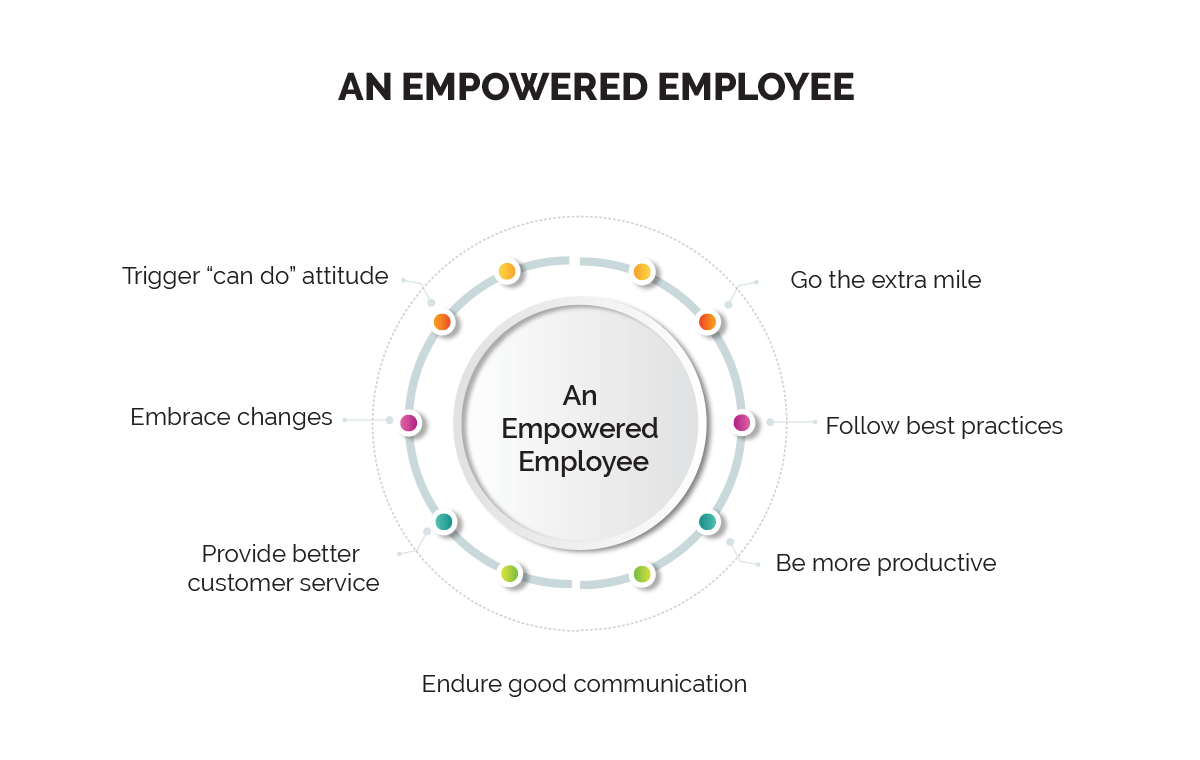
Therefore, many employers are trying to empower their employees. However, many employers are still not sure about how to start with employee empowerment.
Why Should You Make Employee Empowerment Your Priority
It is no secret that employee empowerment has many benefits. Moreover, organizations who’s employees feel empowered see much better business performance, outcomes, and stronger core company values.
Let’s now take a look into the top 4 reasons why organizations should drive empowerment in the workplace.
1. It Impacts the Business’s Bottom Line
Companies that empower employees experience better financial rewards and outperform competitors.

According to HuffPost, more than 70 percent of executives believe that employee engagement is key to organizational success, resulting in 22 percent higher productivity and more than twice as much annual net income.
Indeed, when it is made easy for employees to learn and improve as easily as possible, employee productivity soars and organizations can outperform the competition.
However, many businesses struggle to empower and engage their employees. As a result, U.S. companies are losing a whopping $450 billion a year in productivity.
2. It Keeps Employees Inspired and Engaged
Engaged employees will impact the bottom line and give their best at work.
Providing enough support and guidance, while listening to individual needs and believing in everyone’s know-how, can help employees be assured that they are being treated as individuals.
That’s why employee empowerment is the key!
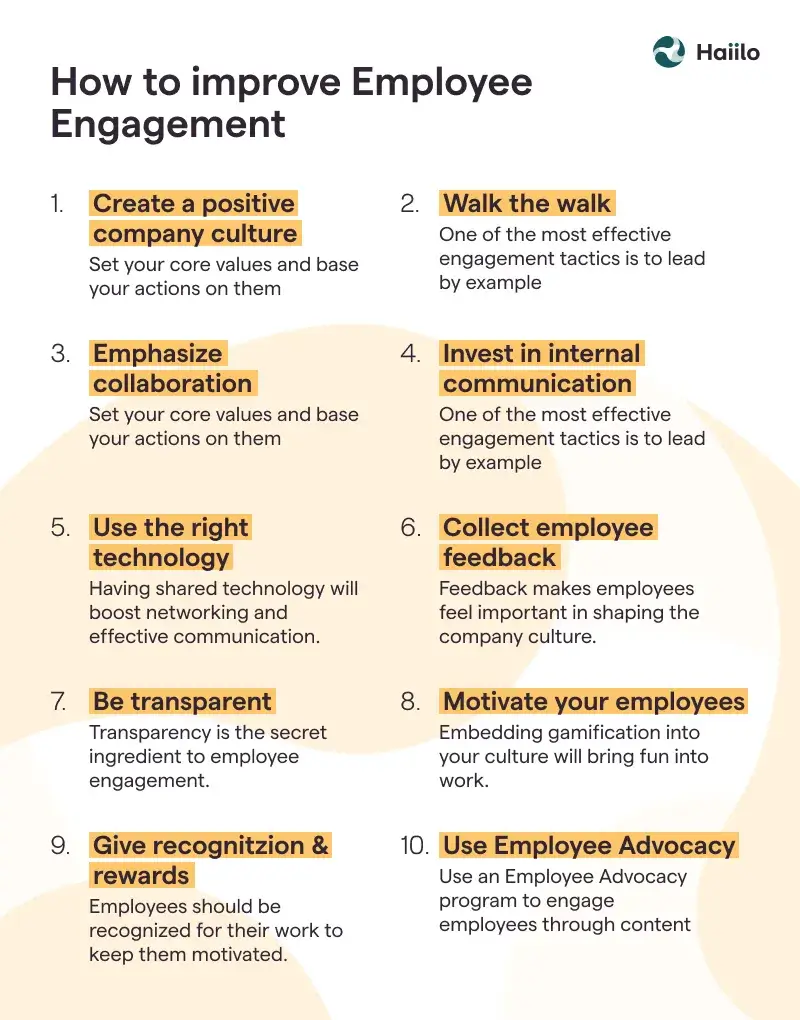
But keep in mind that empowering and engaging employees is all about providing them with the information they need when they need it so they have a great understanding of the business and can be successful at their jobs.
Remember that employees spend on average 2.5 hours per day searching for the information they need to do their jobs! Therefore, improved business communication can go a long way in driving and facilitating employee empowerment.
This can mean having shared technology in place and providing informative company and industry-related content that employees can share either internally or externally.
Related: 8 Employee Engagement Statistics You Need to Know [INFOGRAPHIC]
3. It Helps You Retain Top Talent
Helping your employees brand themselves and grow professionally and personally is one of the best ways to retain your top talent and encourage employees to have a positive bond with your brand.
Think about it: TINYpulse found that employees who feel in control of their career are 20% more likely to stay in their roles. What’s more, LinkedIn found that 93% of employees would stay at a company longer if it invested in their careers.
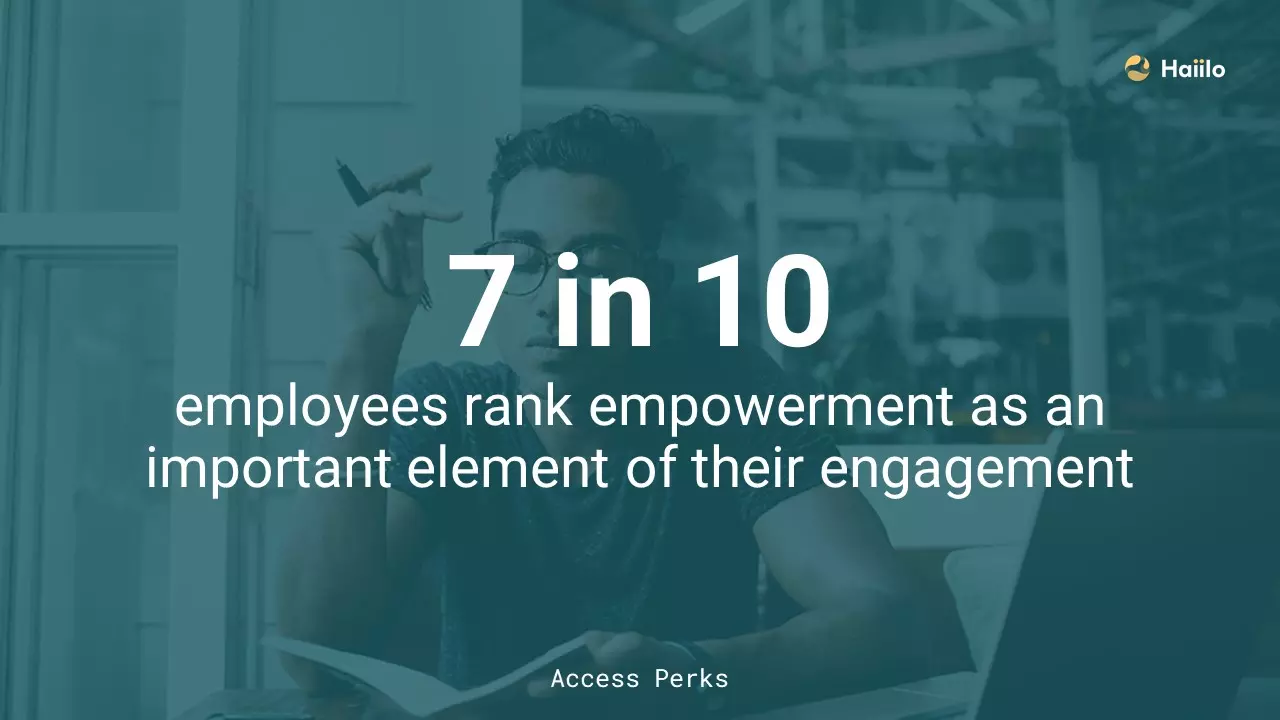
And investing in employee empowerment is a win-win situation. Supporting employees’ personal branding efforts by encouraging them to network professionally, share professional content, and build their thought leadership is good for both the company and its individuals.
4. It’s Good for Your Brand
Employees who feel empowered and in charge of their work will gladly advocate for the brand to their social networks. And the benefits of employee advocacy are significant!
Employees who share company-related content on social media and spread the good word around can do wonders for your employer brand.
Positive word-of-mouth marketing pays itself back in good online reviews, job referrals and a stellar sentiment around your brand online.
Related: Recruitment vs. Talent Acquisition [Infographic Included]
The Role of Company Culture in Employee Empowerment
Your company culture plays an essential role in employee empowerment and building a better employee experience in the workplace.
Basically, if you want to support your employees’ performance, help them find meaning at work, and understand how their jobs impact the business, you need to foster the “right” company culture for that.

And by the “right” company culture, I mean a company culture that supports innovation in the workplace, employees’ well-being, and helps them take initiatives at work.
But keep in mind that building a company culture that supports employee empowerment doesn’t come overnight. First, you’ll need to include employee empowerment in your business goals.
Think about it: if you want to empower your employees, you’ll need first to make it one of your top priorities!
Making empowerment in the workplace one of your business goals is one of the best ways to 1. commit to it 2. make sure that everyone understands that employee empowerment is a top priority for the company.
Then, you’ll need to build an internal communication that enhances employee empowerment. And to reach this goal, you’ll need to make sure that your IC strategy involves HR and IC functions, but line managers as well.
Indeed, the way you speak to your employees and the initiatives you take to motive and inspire them has a direct impact on how employees feel about their jobs, their managers and the company overall.
When it comes to empowerment in the workplace, managers and team leaders play an essential role. That’s not surprising that communication skills are some of the most in-demand soft skills.
Related: 18 Leadership Communication Trends to Look For in 2020
The Key to Employee Empowerment is Your Company Culture
If you’re still not convinced about the connection between the company culture and employee empowerment, check out this video by Great Place to Work.
In this short video, Executive Vice President Gary Peterson of O.C. Tanner, a Fortune 100 Best Company to Work For, explains how empowering employees supports the company’s growth in so many different ways and how they got there:
📚 Also read about how to build a great workplace culture.
The Role of Communication in Driving Employee Empowerment
Your leadership and communication skills have a direct impact on your ability to motivate, support and inspire your employees. This is why transformational leadership has become so important.
When it comes to empowerment in the workplace, it’s all about communicating the right messages to the right employees at the right time and in the right way.
For example, you may be sharing the right messages with your employees, but if you don’t communicate it in the right way, you may not get your message through!
Worse, you may even end up having your employees not trusting you anymore because of poor or inadequate communication skills!
Indeed, according to Forbes, 63% of employees don’t trust their leader. And this situation may lead to frustration and disengagement in the workplace. That’s why you need to develop strong communication skills.
There are plenty of definitions of great leaders. but they all have one thing in common: great leaders are great communicators.
In a nutshell, great leaders know how to:
- Translate the company’s vision into reality
- Enhance dialogues in the workplace
- Listen to their employees
- Include employees in decision making
- Build trust in the workplace
- Encourage their teams
- Make complex ideas easy to understand for everyone
- Help employees take ownership over their work
- Inspire others
Achieve Empowerment in the Workplace With the Right Technology
To foster a culture of empowerment, it is crucial to improve employee communications and knowledge sharing in the workplace.
Companies around the world use Haiilo Home to boost employee collaboration and communication in order to encourage employee empowerment.
In a nutshell, Haiilo Home enhances empowerment in the workplace by:
- Helping employees to stay up-to-date with the company news and industry trends
- Helping employees to get the information they need when they need it so they don’t have to spend time looking for it
- Providing employees with a space for collaboration
- Encouraging employees to communicate through their favorite channels
- Allowing employees not only to reach to company news, but to drive discussions in the workplace through pages and communities
- Allowing employees to personalize their newsfeed so they receive content on the topics they are interested in in addition to the content shared within their teams




